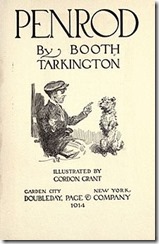 When I was twelve I discovered in an old box of books a novel by Booth Tarkington. “Penrod” was the story (or rather, a collection of stories) about Penrod Schofield, an eleven-going-on-twelve-year-old boy in the Midwest. Indiana, I think.
When I was twelve I discovered in an old box of books a novel by Booth Tarkington. “Penrod” was the story (or rather, a collection of stories) about Penrod Schofield, an eleven-going-on-twelve-year-old boy in the Midwest. Indiana, I think.
I was twelve, Penrod was twelve; we were both noted for getting into trouble which, at the time, seemed perfectly reasonable. Dressing up in the janitor’s clothes for a Christmas play? Making a concoction of various household discarded foods and giving it to a neighbor boy who accepts abuse as the price of friendship? Eating far too many things at the fair & as a result having a ginormous stomach-ache?
Penrod’s world was my world. I didn’t see other things in the novel that today stand out as egregiously wrong. Penrod’s world was built for Penrod and people like him: young white males who would grow up (one hopes) to be the captains of industry, good moral men, upright church members, family patriarchs, pillars of their community. Harum-scarum as kids, but given enough time and guidance, capable of growing up from boys into men.
We protect the twelve-year-olds among us. We know they’re twelve. They’re not really adults, not really kids, not really even teen-agers. Just old kids who have the brains of a warm ball of mush, who have yet to be awakened by puberty, who have reached the limits of kid-hood. Impulsive, somewhat aware, somewhat educated, but fully unaware of the dangers around them and the dangers of acting impulsively. We protect them because, left to their own devices, they might harm themselves or others.
We don’t, generally, harm them for being twelve. We don’t throw them in jail for their offenses, we don’t (generally) physically harm them as adults, we don’t abuse them (in principle) because even though “boys will be boys,” they’re still only children.
As adults we shake our heads, clean up their messes, reprimand them for their actions, attempt to educate them and steer them, and hope that by their thirteenth birthday they will have left behind their childhood as they journey into manhood.
Twelve-year-olds, especially twelve-year-old males, seem to think they’re invincible and that their actions have no recompense. They can hoot and holler and rant, and then run off, knowing that they will escape much of the responsibility for acting like—well, kids.
Twelve-year-olds role-play and imagine they’re bigger and stronger than they really are. They see the adults around them and imagine what it would be like to be Big and Tough, and emulate those actions, even though they cannot back up their imaginations with accomplishment.
Sometimes they hang out with their younger brothers and sisters in public parks, wishing they could be older and more respected, imagining that if, for one day, they were a man, they’d be able to do great things.
Sometimes they go so far as to dress up as if they were adults, with their clothing and their fake armor and their toy guns.
What they don’t expect is that their attempts at play-acting and dress-up will lead to their death by irrational, angry, fearful, emotionally unstable cops, and what they don’t expect—in their wildest dreams they don’t expect—is that these same cops which would kill them would then get off because those cops see a twelve-year-old as a lethal threat.
“C’mon,” they’d say. “We know we’re twelve. We dress up and we pretend. But we’re twelve.”
 There is something seriously, horribly wrong with our world when we expect twelve-year-old boys to be responsible as fully grown adults, and cops to be entirely irresponsible and unaccountable for killing twelve-year-old boys.
There is something seriously, horribly wrong with our world when we expect twelve-year-old boys to be responsible as fully grown adults, and cops to be entirely irresponsible and unaccountable for killing twelve-year-old boys.
He was twelve.
Tamir Rice, shot by Cleveland police.
Twelve
Years
Old.

